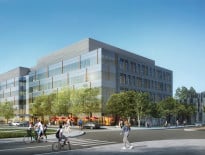Home prices are already insane around here. And while it may be hard to imagine how they could get any crazier, it looks like we will be finding out soon enough.
Massachusetts is gaining new jobs and new residents at about three to four times the rate it is building new homes, condos and apartments.
So far this decade, Massachusetts has added 353,000 new jobs, nearly a quarter million new residents, but has granted permits for just 81,000 new housing units.
That’s not even enough to keep rents and prices in check over the coming years, let alone start bringing them down to more reasonable levels.
And the epicenter of our state’s housing crisis can be found in Greater Boston, which would need 44,000 new units tomorrow just to keep pace with current demand. At the current, anemic rate of new construction, that gap will push past the 90,000 mark by 2030.
So reads the latest warning about our state’s troubled housing market issued by the Massachusetts Housing Partnership, which has been pushing for years for reforms in local zoning laws that would open the door to more badly needed homes and rentals of all types.
MHP shared its findings with a group of key state lawmakers over the summer in a presentation whose title, if rather dry, gets right to the point, “Housing Supply in the Commonwealth.”
Still, the latest numbers were even somewhat of a surprise to Clark Ziegler of MHP, especially the large and growing gap between the number of jobs being created, spun off by the red hot Massachusetts economy and the relatively thin stream of new residential construction coming online.
“I think the magnitude of the difference was what was striking to me,” Ziegler says. “It is become increasingly unsustainable.”
By unsustainable, Ziegler points to things that shouldn’t be a mystery to anyone who is not living in a multimillion-dollar penthouse in downtown Boston.
Massachusetts and the Boston area especially have long been in a “coping” mode when it comes to an even tighter and ever more expensive housing market.
College graduates are living at home with mom and dad to save up for their own place or simply to have enough money saved up to pay off their loans; families are doubling up in apartments; and homeowners are making do with starter homes long after they’ve outgrown them, unsure whether they can find – or afford – anything else.
Unsustainable, means something beyond just more misery, though.
As prices rise ever higher and the number of frustrated buyers mounts, it could very well threaten to unravel the Massachusetts economic success story.
We could very well wind up seeing middle-class families flee the state for less expensive locales – it happened back during the last run-up in the mid-2000s.
And it’s a phenomenon already well at work in Boston, which has been fast losing its once broad middle class.
The housing scorecard, as we turn the corner and head towards the end of the 2010s is far from encouraging.
Comparing Cities
Certainly MHP’s new report lays out some very troubling stats.
Probably the most stunning is how Massachusetts tops the chart in the housing price index, blowing away the national average and even leaving other high-priced metro markets in the dust.
The baseline is set at 100, representing prices in 1980. The blue line representing the Bay State soars over 700 before the Great Recession, dipping a bit and then bouncing back in the last year or two over 700 again.
The national average had never risen above the 400 mark; by comparison, the high-water mark for both New York and California is just above 600.
Another telling stat is the number of building permits issued across Massachusetts, dropping from a high of 30,000 a year in the 1970s, down to 25,000 in the 1980s (when it was in line with the national average), on down to the high teens in the 1990s and now down again to maybe 12,000 or so a year in the 2010s.
The Boston area is also near the bottom of the pack in building new housing when it comes to other new economy metro hubs it competes with workers for. Cities like Seattle, Denver and Austin are rolling out each year two, three and even five times the number of new homes and apartments.
MHP is certainly delivering a tough message here. But there are signs that it may be finally getting through to the right people on Beacon Hill.
The Joint Committee on Housing over the summer reported a proposal that would require cities and towns across the state to open their doors to more housing by reforming their zoning laws.
As we head into the fall, it is now before the House Ways and Means, with signs that legislative leaders may be ready to get something done, or at least give it a good try.
If not, we are looking at more of the same, which is bad news for buyers, sellers, renters and everyone else with a stake in the Bay State’s infuriatingly dysfunctional real estate market.




 |
| 





